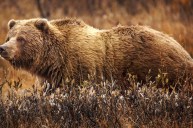Citing a growing number of grizzlies attacking humans and livestock, the Canadian province of Alberta announced plans to create a network of rapid responders who can track and kill problematic bears whenever a conflict occurs.
"The loss of even one human life because of a grizzly bear attack is one too many," said Todd Loewen, Alberta's minister of Forestry and Parks, in an announcement. "We are taking a proactive approach to help Albertans co-exist with wildlife through our new wildlife management program. These changes demonstrate our commitment to ensuring Albertans can safely work and recreate throughout the province."
According to the announcement, the number of grizzly bears in Alberta tripled from 2020 to 2021 (from three to nine). Plus, the province recorded a total of 104 attacks between 2000 and 2021. Additionally, grizzly and black bears killed 120 heads of livestock in 2023, which amounted to $153,658 and $13.3 million in crop losses.
"Losses suffered due to predation can be a significant blow to ranchers and farmers," said RJ Sigurdson, Alberta's minister of Agriculture and Irrigation. He argued that the new plan would help reduce the economic losses and help farmers and livestock producers avoid conflicts with wildlife.
"This is not a bear hunt"
In the announcement, the Alberta officials clarified that their plan was "not a bear hunt," but rather, "a measure to ensure the safety of humans and livestock." However, some disagree and argue that officials introduced the measure to nudge it in that direction.
Nicholas Scapillati, head of the non-profit Grizzly Bear Foundation, told The Guardian that officials are using fear to push an agenda. "No one was consulted in this decision - not the biologists, not the independent conservation groups, not the First Nations."
Scapillati added: "It's an absolute slap in the face to the province's grizzly recovery plan. We know how to lower the risk of dangerous interactions with bears - and it's not going out and killing them."
The 2010 grizzly bear recovery plan lists grizzly bears as a species of special concern, but does not provide federal protections. At the start of the plan, Alberta's grizzly population amounted to 700 to 800, but officials say it has grown to roughly 1,150.
In a Facebook post, Ryan Phinney, a wildlife expert who managed bears as a volunteer for Alberta Parks, argued that Loewen loaded the press announcement with sensationalized language to complete a narrative rather than properly manage the bear population.
"This is a typical smoke and mirrors campaign being pulled off by a bully in power," Phinney said. He added that he would accept hunting as part of a management plan if the science supported it, but the proposal doesn't have it.
"In this release, the assumption is there is 1,150 bears now, assumptions, and guesses are not science, definitely not accurate data. This proposal or amendment is to get back to a full hunt," he said.




